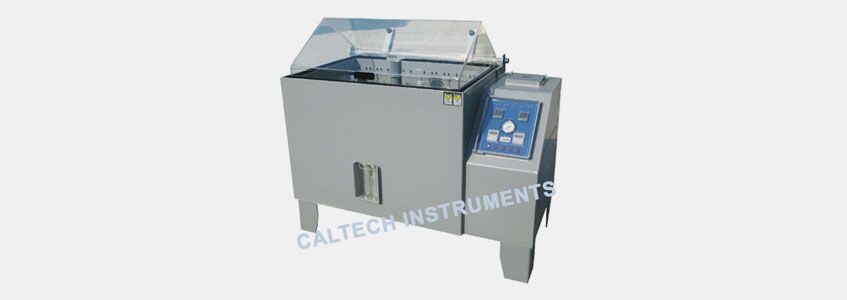Description
Caltech India offers Salt Fog Cabinets. The salt spray test is a standardized test method used to check corrosion resistance of coated samples. Coatings provide corrosion resistance to metallic parts made of steel, zamak or brass. Since coatings can provide a high corrosion resistance through the intended life of the part in use, it is necessary to check corrosion resistance by other means. Salt spray test is an accelerated corrosion test that produces a corrosive attack to the coated samples in order to predict its suitability in use as a protective finish. The appearance of corrosion products (oxides) is evaluated after a period of time. Test duration depends on the corrosion resistance of the coating; the more corrosion resistant the coating is, the longer the period in testing without showing signs of corrosion.
Salt spray testing is popular because it is cheap, quick, well standardized and reasonably repeatable. There is, however, only a weak correlation between the duration in salt spray test and the expected life of a coating (especially on hot dip galvanized steel where drying cycles are important for durability), since corrosion is a very complicated process and can be influenced by many external factors. Nevertheless, salt spray test is widely used in the industrial sector for the evaluation of corrosion resistance of finished surfaces or parts.
The apparatus for testing consists of a closed testing chamber, where a salted solution (mainly, a solution of 5% sodium chloride) is atomized by means of a nozzle. This produces a corrosive environment of dense saline fog in the chamber so that parts exposed in it are subjected to severely corrosive conditions.
Tests performed with a standardized 5% solution of NaCL are known as NSS (neutral salt spray). Results are represented generally as testing hours in NSS without appearance of corrosion products (e.g. 720 h in NSS according to ISO 9227). Other solutions are acetic acid (ASS test) and acetic acid with copper chloride (CASS test), each one chosen for the evaluation of decorative coatings, such as electroplated copper-nickel-chromium, electroplated copper-nickel or anodized aluminum.
Some sources do not recommend to use ASS or CASS test cabinets interchangeably for NSS tests, as it is claimed that a thorough cleaning of the cabinet after ASS or CASS test is very difficult. ASTM does not address this issue, but ISO 9227 does not recommend it and if it is to be done, advocates a thorough cleaning.
Biuged offer various Salt Spray Cabinets from 150L capacity to customized cabinets according to different requirements.
Features:
- Shell of inside and outside both adopts imported PVC hard plastic board which have a good corrosion resistance and age resistance, no leaking and surface is easy to clean.
- Tower design for spraying fog system ensures slat fog distribute equally. Settlement can be adjusted freely.
- Box cover is made of hard transparent PPM or PVC hard plastic board, operator can view sample status during test anytime.
- Use a hot water storage heater which is located at bottom of cabinet to heat, adopts titanium alloy material and far-infrared heating way to heat. Thus can rise temperature rapidly, and make the whole cabinet temperature become more uniform. So,the cabinet temperature is easy to control.
- Plug board and other electronic components are fixed at position which is convenient for checking and maintaining. With door lock open-type side coven plate, easy to maintain.
- Equipped with no-crystal glass spraying nozzle.
- Spray mode: can select Continuous Spary or Period Spray.
- High precision digital display temperature controller (error is less than 0.1℃), import executive parts
- Multi-ply safety protection:Oven temperature,lack water,double pressure adjustment.
- With demist function, with water-seal structure,no salt fog leakage.
Standards:
- ASTM B117 《Standard Practice for Operating Salt Spray (Fog) Apparatus》
- ASTM B368 《Standard Test Method for Copper-Accelerated Acetic Acid-Salt Spray (Fog) Testing (CASS Test)》
- ASTM B380 《Standard Test Method for Corrosion Testing of Decorative Electrodeposited Coatings by the Corrodkote Procedure》
- ASTM G85 – 11 《Standard Practice for Modified Salt Spray (Fog) Testing》
- ASTM D1735 《Standard Practice for Testing Water Resistance of Coatings Using Water Fog Apparatus》
- ISO 7253 《Paints and varnishes — Determination of resistance to neutral salt spray (fog)》
- ISO 9227 《Corrosion tests in artificial atmospheres — Salt spray tests》
- DIN 50021 《Salt Spray Testing》
Main Technical Parameters:
| Ordering Information Technical Parameters: | BGD 880 | BGD 881 | BGD 882 |
| The scope of adjustable temperature | From ambient +5 to 50℃ | ||
| Fluctuating degree of temperature | ≤± 0.5℃ | ≤± 0.5℃ | ≤± 0.5℃ |
| Homogeneous degree of temperature | ≤ 2℃ | ≤ 2℃ | ≤ 2℃ |
| Deviation of temperature | ≤± 2℃ | ≤± 2℃ | ≤± 2℃ |
| Sedimentation speed of salt fog | 1-2ml/80cm2.h | 1-2ml/80cm2.h | 1-2ml/80cm2.h |
| Cubage | 108 L | 270 L | 412 L |
| Interior Dimension(L×W×H) | 450×600×400mm | 600×900×500mm | 750×1100×500mm |
| Overall Dimension(L×W×H) | 720×1010×1080mm | 950×1550×1290mm | 1680×950×1450mm |
| Total power | 1.2 KW | 3 KW | 5 KW |
| Gross Weight | 175Kg | 300Kg | 500KG |
In India, we have various customers from Mumbai, Delhi, Bangalore, Chennai, Hyderabad, Ahmedabad, Kolkata, Surat, Pune, Jaipur, Lucknow, Kanpur, Nagpur, Visakhapatnam, Indore, Bhopal, Patna, Vadodara, Ghaziabad, Ludhiana, Coimbatore, Madurai, Nashik, Srinagar, Aurangabad, Dhanbad, Allahabad and Ranchi in India.
